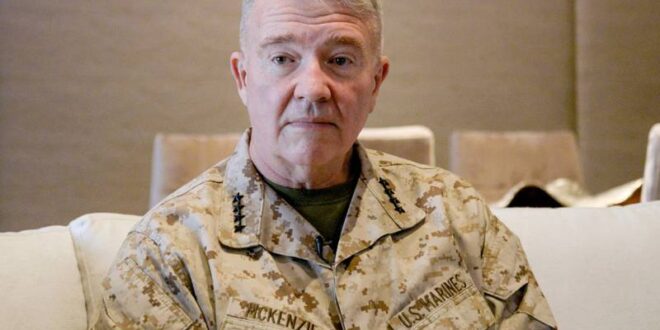US Central Command chief says F-22 Raptor squadron will arrive in Emirates next week
The US military commander in the Middle East is planning to target Houthi missiles and drones on the ground before they are fired towards the UAE.
Lt Gen Kenneth McKenzie said the plan is part of a range of measures designed to protect the Emirates from the rebel group in Yemen.
Speaking in Abu Dhabi on Tuesday, the head of US Central Command (Centcom) said a squadron of F-22 Raptor fighter jets will arrive in the next week.
“We’re going to bring in a squadron of F-22 fighter jets, the best air superiority fighters in the world,” he told UAE state news agency Wam.
“They will also work with their UAE partners to help defend the nation. We think this is just one friend helping another in a time of crisis.”
Lt Gen McKenzie said the UAE’s Terminal High Altitude Area Defence system (Thaad) had successfully intercepted two attempted strikes, and that the US is working to strengthen Emirati defences further.
“I know that it sends a strong message of reassurance to everyone in UAE. We will continue to work with UAE to make that system even better in the future,” he said.
Lt Gen McKenzie met Lt Gen Hamad Al Rumaithi, Chief of Staff of the UAE Armed Forces, on Tuesday.
Last week, the Pentagon said it would send fighter jets and a guided missile warship after the recent attacks on the Emirates by the Houthi rebels in Yemen.
The USS Cole will link up with UAE naval vessels before docking in Abu Dhabi. The ship is armed with an advanced sea-to-air system designed to intercept incoming missiles and projectiles.
Tackling drone attacks
Lt Gen McKenzie said: “We are working with our partners here in the region and with the industry back in the United States to develop solutions that would work against drones. We would like to work against drones what we call ‘Left of Launch’, [which means] before they can be launched.”
Such a system will be able to detect the launch of drones, see them and disrupt their flight.
“And if you can’t do that, you will certainly be able to shoot them down as they reach their intended target,” he said.
“In all of those areas we’re working with our friends internationally as well as with industries in the United States to become more effective at that.”
Immediate US military support to UAE
“Even as the UAE has come under attack, the United States has moved quickly and swiftly to help an old friend. We brought a destroyer in, a guided-missile destroyer, the USS Cole, which has ballistic missile defence capabilities.
“It will patrol the waters of the UAE, working closely with UAE air defenders to protect their nation,” he said.
“Additionally, over the next week or so, we’re going to bring in a squadron of F-22 fighter jets, the best air superiority fighters in the world.
“They will also work with their UAE partners to help defend the nation. So, we think this is just one friend helping another in a time of crisis.”
Impact of Houthi terrorist designation
Asked about the US government’s decision to consider re-designating the Houthis as a terrorist organisation, Lt Gen McKenzie said: “I would leave the questions about designating the Houthis to the diplomats.
“But I would tell you this – the Houthis are behaving in a reckless and irresponsible manner as they attacked the UAE and they have continued to attack the Kingdom of Saudi Arabia.”
About the killing of Daesh leader Abu Ibrahim Al Hashimi Al Qurayshi during a US counterterrorism raid in north-west Syria last Wednesday, Lt Gen McKenzie said: “Taking the international leader of ISIS off the table makes it hard for them to co-ordinate their activities across the globe.
And certainly, while regional aspects of ISIS will remain, it will be harder for them to co-ordinate their activities across continents.”
But he said ISIS is still a threat in its current form.
“I do not believe it has been done away with,” he said.
“I think that threat will be with us for a long time. Our goal of encountering this threat is not to have a bloodless or a nonviolent future, because, tragically, I don’t think that’s going to be a possible outcome.”
Al Qaeda affiliates in Afghanistan
The US is watching the situation Afghanistan very closely, Lt Gen McKenzie said, after the country fell to the Taliban in August.
Of most concern is mostly the ability of Islamic State Khorasan, a regional affiliate, and Al Qaeda to mount attacks against the US and its allies. “That’s what we’re looking at when we look into Afghanistan. That’s the principal concern that we have right now.”
 Eurasia Press & News
Eurasia Press & News




